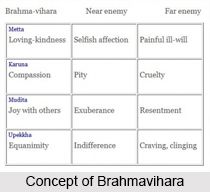 Brahmavihara is a Buddhist concept in the philosophy of Buddhism which describes the "abodes of Brahma".
Brahmavihara is a Buddhist concept in the philosophy of Buddhism which describes the "abodes of Brahma".
Concept of Brahmavihara
Brahmavihara is dealing with a series of four virtues of Buddhism. The meditation practices of Brahmavihara, which is made to cultivate them. They are also known as the four immeasurable.
Brahmavihara in Metta Sutta
According to the Metta Sutta, Gautama Buddha held that cultivation of the four immeasurables has the power to cause the practitioner to be reborn into a "Brahma realm" (Pali: Brahmaloka). The mediator is instructed to radiate out to all beings in all directions the states of loving-kindness or benevolence, compassion, empathetic, joy and equanimity.
Four Immeasurables of Brahmavihara
The four immeasurables are also found in the Yoga Sutras of Patañjali. It is a text composed long after the beginning of Buddhism and substantially influenced by Buddhism. These virtues are also highly regarded by Buddhists as powerful antidotes to negative mental states (non-virtues) such as avarice, anger and pride. Brahmavihara may be parsed as Brahma and vihaha; which is often rendered into English as "sublime" or "divine abodes".
Translation of Apramana
Apramana, usually translated as the immeasurables, means "boundlessness, infinitude, a state that is illimitable". When developed to a high degree in meditation, these attitudes are said to make the mind "immeasurable" and like the mind of the loving Brahma (gods).
Natures of Human Traits in Brahmavihara
Brahmavihara defines the loving-kindness towards all: the hope that a person will be well; the wish that all sentient beings, without any exception, be happy. Compassion is the hope that a person`s sufferings will diminish; "the wish for all sentient beings to be free from suffering. Empathetic joy means the joy in the accomplishments of a person, oneself or another; sympathetic joy; the wholesome attitude of rejoicing in the happiness and virtues of all sentient beings. Equanimity is about the learning to accept loss and gain, good-repute and ill-repute, praise and censure, sorrow and happiness (Attha Loka Dhamma), all with detachment, equally, for oneself and for others. Equanimity is not to distinguish between friend, enemy or stranger, but regard every sentient being as equal. It is a clear-minded tranquil state of mind-not being overpowered by delusions, mental dullness or agitation. Loving-kindness and compassion can both be viewed as hopes for the future leading, where possible, to action aimed at realizing those hopes. Joy and equanimity can be seen as attitudes useful for reflecting on what has already passed and, through this reflection, present us with an opportunity to apply knowledge to our actions. Consequently while the four immeasurable might be delineated as attitudes to the future or past, they contain the seed of the "present" within their core; as they manifest new ways to act (a living embodied practice). In this context, a living bodied practice can be a dedicated intention that we are in the "here and now"; that is to say we experience both a tranquil awareness of at once) our own and other being`s gifts and accomplishments and b) tranquil awareness of moments where our own and other being`s actions do not reflect the four immeasurable.




















